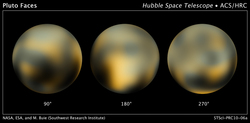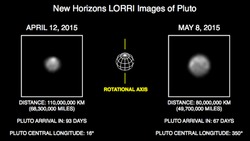Jimmy Doug
If you know what's good for you ...
One of the things that as a kid I decided I wanted to see before I die is about to happen: we're only weeks away from Pluto. I remember as a child imagining what it looked like, flicking through all the astronomy books I could get my hands on to look for clues. Then, when I was a teenager, the Hubble telescope went up and I waited impatiently for it to turn its eye on the thing that had fascinated me for so long. I remember seeing the first photo on the shelves of a newsagents on the cover of an astronomy magazine - with its disproportionately sized moon, Charon. I can't find that exact photo now, but it was something like this:

But I had to be patient for a long, long time before anything of the surface could be revealed. And for years, these were the best pictures we had, the only ones that gave even a clue about the face of this mysterious object so far away it takes light 5 hours to get there:

In 2006 New Horizons was launched. What amazed me at the time, and still amazes me to this day, was how little media coverage this revolutionary probe received. We're talking about one of the most sophisticated spacecraft ever to have been built and the fastest madmade object ever, journeying to the last planet yet to be seen. Of course, a few months afterwards, following the discovery of other large, spherical bodies that lie beyond Pluto (including Eris, which could actually be bigger than Pluto), in their wisdom the IAU decided that as Pluto doesn't clear its own path through space it should be demoted to a new category of object they called dwarf planet. I didn't understand this at the time, and still don't.
As a kid I'd always felt there was something special about Pluto, that if we could somehow see it we'd sit up and gasp, 'Wow - this is more than just a cold, grey piece of rock in space!' And now that the first photos that better those taken by Hubble are at last arriving, it does indeed seem that this world is far, far more than just a cold lump of rock. What's more (as has been known for a few years now) it isn't grey at all, but red - in fact, it could be redder even than Mars, it could be the reddest object in the solar system.

It has not just one moon but five (and possibly more), an atmosphere, weather, ice geysers, something called spider patterns that have only ever been seen on Mars, a very large polar cap ... it might even have rings. This boring piece of rock could well be one of the most extraordinary objects so far seen in the solar system.
So, here I am every day scouring the news for the latest titbits of information, waiting for my childhood dream to at last come true.
Is anyone else as excited as I am about this?
But I had to be patient for a long, long time before anything of the surface could be revealed. And for years, these were the best pictures we had, the only ones that gave even a clue about the face of this mysterious object so far away it takes light 5 hours to get there:
In 2006 New Horizons was launched. What amazed me at the time, and still amazes me to this day, was how little media coverage this revolutionary probe received. We're talking about one of the most sophisticated spacecraft ever to have been built and the fastest madmade object ever, journeying to the last planet yet to be seen. Of course, a few months afterwards, following the discovery of other large, spherical bodies that lie beyond Pluto (including Eris, which could actually be bigger than Pluto), in their wisdom the IAU decided that as Pluto doesn't clear its own path through space it should be demoted to a new category of object they called dwarf planet. I didn't understand this at the time, and still don't.
As a kid I'd always felt there was something special about Pluto, that if we could somehow see it we'd sit up and gasp, 'Wow - this is more than just a cold, grey piece of rock in space!' And now that the first photos that better those taken by Hubble are at last arriving, it does indeed seem that this world is far, far more than just a cold lump of rock. What's more (as has been known for a few years now) it isn't grey at all, but red - in fact, it could be redder even than Mars, it could be the reddest object in the solar system.
It has not just one moon but five (and possibly more), an atmosphere, weather, ice geysers, something called spider patterns that have only ever been seen on Mars, a very large polar cap ... it might even have rings. This boring piece of rock could well be one of the most extraordinary objects so far seen in the solar system.
So, here I am every day scouring the news for the latest titbits of information, waiting for my childhood dream to at last come true.
Is anyone else as excited as I am about this?





